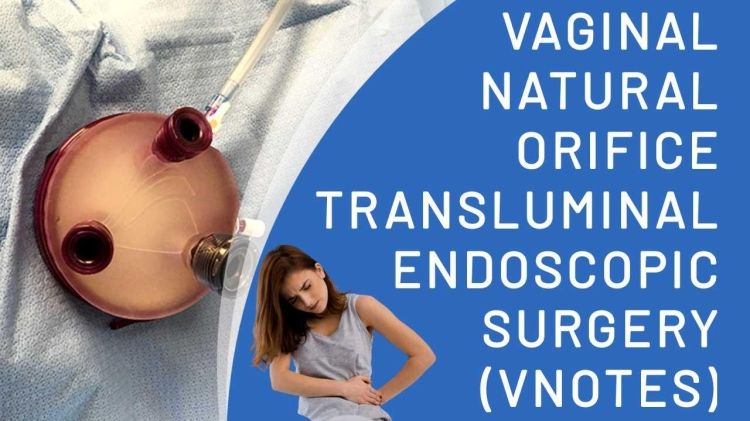Literature indicates that vaginal natural orifice transluminal endoscopic surgery (vNOTES) may now be the preferred method for hysterectomy and adnexectomy, even in complex cases of large uteri or high body mass index, compared to conventional laparoscopic and vaginal approaches. Multiple studies cite improved patient outcomes and benefits, including shorter duration of surgery and length of stay, lower pain scores and total dose of analgesics, and higher patient satisfaction.
The vNOTES technique overcomes these challenges by combining the benefits of laparoscopic and traditional vaginal surgery using the Applied Medical GelPOINT® V-Path transvaginal access platform, which enables access into the peritoneal cavity through the vagina.
Introduction:
In recent years, there has been a trend towards less invasive surgical techniques, and vaginal natural orifice transluminal endoscopic surgery (vNOTES) is one of them. vNOTES is a minimally invasive surgical technique that allows surgeons to operate through the natural opening of the vagina without making any incisions. The procedure has several benefits over traditional laparoscopic and robotic surgeries. This essay will discuss the benefits of vNOTES and why it is becoming increasingly popular.
What is vNOTES?
vNOTES is a surgical technique that involves inserting a small endoscope through the vagina to view the abdominal cavity. It is a minimally invasive technique that does not require any incisions. The procedure is performed under general anesthesia, and the patient is discharged on the same day or within 24 hours.
Benefits of vNOTES:
- Minimal Scarring
One of the significant benefits of vNOTES is minimal scarring. As the procedure does not require any incisions, there are no scars on the abdomen. This is particularly beneficial for women who are concerned about their appearance and do not want any visible scars. The procedure is performed through the natural opening of the vagina, and the scars are hidden.
- Reduced Pain
Another significant benefit of vNOTES is reduced pain. As the procedure is minimally invasive, there is less tissue damage, and the patient experiences less pain. In traditional laparoscopic and robotic surgeries, several incisions are made, and the patient may experience significant pain after the surgery. However, in vNOTES, the patient experiences less pain and recovers faster.
- Shorter Hospital Stay
vNOTES is a same-day surgery, and the patient is discharged on the same day or within 24 hours. This is particularly beneficial for women who have to take care of their families and cannot afford to spend several days in the hospital. Traditional laparoscopic and robotic surgeries may require a longer hospital stay, which can be inconvenient and expensive.
- Faster Recovery
As vNOTES is a minimally invasive surgical technique, the patient recovers faster. The patient can resume normal activities within a few days after the surgery. Traditional laparoscopic and robotic surgeries may require a longer recovery period, and the patient may have to take several weeks off from work.
- Lower Complication Rates
vNOTES has a lower complication rate than traditional laparoscopic and robotic surgeries. As the procedure is minimally invasive, there is less tissue damage, and the risk of complications is reduced. Traditional laparoscopic and robotic surgeries may have a higher risk of complications, such as bleeding, infection, and organ damage.
- Cost-effective
vNOTES is a cost-effective surgical technique compared to traditional laparoscopic and robotic surgeries. As the procedure does not require any incisions, the cost of the surgery is reduced. Traditional laparoscopic and robotic surgeries require expensive equipment, which increases the cost of the surgery. vNOTES is a same-day surgery, and the patient does not have to spend several days in the hospital, which further reduces the cost of the surgery.
- Safe for Obese Patients
vNOTES is a safe surgical technique for obese patients. Traditional laparoscopic and robotic surgeries may be difficult to perform on obese patients as they require larger incisions, and there is a higher risk of complications. However, vNOTES is performed through the natural opening of the vagina, and the size of the patient does not affect the procedure.
Applications of vNOTES:
vNOTES has several applications in gynecological surgery. Some of them are:
- Hysterectomy
Hysterectomy is the surgical removal of the uterus, and vNOTES can be used to perform a minimally invasive hysterectomy.
- Oophorectomy
Oophorectomy is the surgical removal of one or both ovaries. vNOTES can be used to perform a minimally invasive oophorectomy.
- Salpingectomy
Salpingectomy is the surgical removal of one or both fallopian tubes. vNOTES can be used to perform a minimally invasive salpingectomy.
- Myomectomy
Myomectomy is the surgical removal of fibroids from the uterus. vNOTES can be used to perform a minimally invasive myomectomy.
- Endometriosis Surgery
Endometriosis is a condition in which the tissue that lines the uterus grows outside of it, causing pain and discomfort. vNOTES can be used to perform a minimally invasive endometriosis surgery.
- Pelvic Organ Prolapse Surgery
Pelvic organ prolapse is a condition in which the pelvic organs, such as the bladder, uterus, and rectum, descend into the vaginal canal. vNOTES can be used to perform a minimally invasive pelvic organ prolapse surgery.
Conclusion:
vNOTES is a minimally invasive surgical technique that has several benefits over traditional laparoscopic and robotic surgeries. It has minimal scarring, reduced pain, shorter hospital stay, faster recovery, lower complication rates, and is cost-effective. It is safe for obese patients and has several applications in gynecological surgery. With the increasing demand for minimally invasive surgical techniques, vNOTES is becoming increasingly popular. However, like any surgical technique, it has its limitations and is not suitable for all patients. Patients should consult with their doctors to determine if vNOTES is a suitable option for them.
